Sunday, October 5, 2014 a peoples’ tribunal convened by the Bay Area Rights of Nature Alliance found Chevron, its Richmond refinery and the fossil fuel industry guilty of “violations to human rights and rights of natural ecosystems.” The Bay Area Tribunal puts forth a new vision of living in harmony with the earth and the natural world through recognizing the rights of nature. The rulings call for defining new economic models, social systems and governance structures to create a new path forward that recognize the interdependencies of humans and earth systems.
- Bay Area Rights of Nature Ethics Tribunal (Oct. 2014): Summary Video (7 minutes)
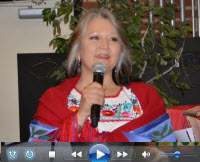
Opening and Context Perspectives
Pennie Opal Plant opened the event by paying respects to the Ohlone peoples, the spirits of the ancestors of the land and the ancient wisdom that lays the foundations for Universal Declaration for the Rights of Mother Earth and earth jurisprudence.
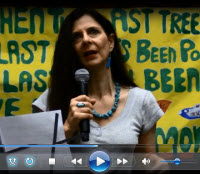
Osprey Orielle Lake, co-founder and Executive Director of the Women’s Earth and Climate Action Network provides background information on the purpose of the Tribunal. The Bay Area Tribunal originated with the International Rights of Nature Ethics Tribunal convened in Quito, Ecuador in January 2014. This international effort will be examining a set of human and nature’s rights cases in Lima, Peru in December 2014 in parallel with the UNFCCC COP 20 meeting. These Tribunals are intended to make formal observations on rights violations that have remained outside the consideration of formal governmental institutions. The process is putting the entire market driven economic and anthropologic legal systems on trial.
The Bay Area Tribunal is also part of the Global Alliance for the Rights of Nature’s 2014 global “Earth Rights Days of Action.”
Tribunal Judges
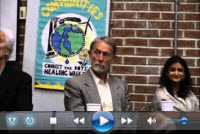
A distinguished Tribunal panel of judges included Carl Anthony, architect, author, urban strategist, co-founder of the Breakthrough Communities Project., Courtney Cummings, Bay Area Native, indigenous leader and Bay Area activist; Brian Swimme, author, professor and founder of the Center for the Story of the Universe; Bill Twist co-founder and CEO for the Pachamama Alliance and Anuradha Mittal founder and executive director Oakland Institute. The judges shared opening statements before the Prosecutor and Defense presented their opening positions.
Prosecutor for the Earth

Citing the Universal Declaration of the Rights of Mother Earth and the Universal Declaration of Human Rights, Prosecutor Linda Sheehan of the Earth Law Center outlined violations of nature’s rights and human rights by the Chevron refinery in Richmond and the broader fossil fuel industry. Ms Sheehan also outlined violations of the rights of communities to freely govern their own well-being, especially in light of Chevron’s controversial new expansion project, its support for specific Richmond candidates for local election, as well as questionable new legislation that would allegedly prevent full public transparency of industry operations.
Furthermore, Ms Sheehan asserted that the overarching governance and economic systems at large are co-conspirators in the violations of nature’s rights, human rights and community rights.
She challenged the judges to find that new laws, economic models and governance structures are needed to create a new path forward and urged that Chevron and the fossil fuel industry be required to support the emerging efforts to redesign legal, social and economic systems to recognize rights of natural systems and systemic solutions.
Arguments for the Defense
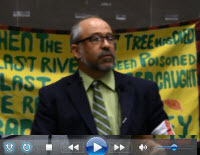
Jeff Conant, presenting potential defenses that Chevron and the fossil fuel industry might raise, highlighted the fact that our existing laws, economic models and governance structures facilitate (and indeed encourage) such harmful behaviors. The actions taken by Chevron and the industry are within the rights as outlined by current laws and the energy economy.
Expert Witnesses for the Earth
Seven witnesses presented evidence of alleged violations to human rights and nature’s rights, the impact of global economic drivers, and proposed systemic solutions for redesigning economic, social and legal systems to pave the way forward toward sustainable economies and social systems.
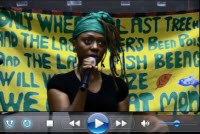
- Environmental Justice Witness, Stephanie Hervey speaks to human rights and environmental rights violations by the fossil fuel industry generally.
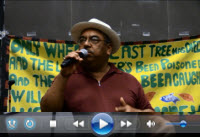
- Local Richmond Witness, Andrés Soto speaks to direct impacts of the operations of Chevron’s Richmond refinery on human rights and nature’s rights.
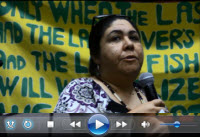
- Indigenous Community Witness, Corrina Gould speaks on behalf of the land itself, and the injuries that the water and land of the Bay Area have suffered from the operations of the Chevron refinery.
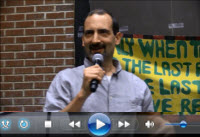
- Global Economist, Marco Vangelisti outlines the global economic drivers that reinforce the injuries caused by the fossil fuel industry. Vangelisti also speaks to the particular harms to people and nature from fossil fuel extraction, including extraction associated with the Chevron Richmond refinery fossil fuel sources.
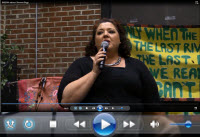
- Community Rights activist, Shannon Biggs speaks to the community rights movement, the rights of nature movement, and the impacts of the fossil fuel industry on nature and people. Shannon pointed out that we are not creating new rights for ecosystems. Those rights come from Mother Earth herself. Rights for nature, rights for earth already exist — we just need to recognize them. Our court of law makes mistakes all the time. And some times it works perfectly, just not for the right person. If we cannot recognize that relationship, then that system of law is out of order. It is not just Chevron we are putting on trial here, it is the system of law that governs how they operate. Our system of law gives the permit for Chevron and the fossil fuel industry to operate in violation of the rights of nature. And who helps write those laws, Chevron does. It is the systems of law we need to change. Our system of law is not setup for justice, but what if it were — what if it were? 180 communities around the US have come to recognize that if our system of law does not work for us, then we need to write new laws. And they are doing that. Communities are ready willing and able to write new laws. Mendocino has written a new law to be free from fracking, because that is their right. It is time to recognize rights for ecosystems now.
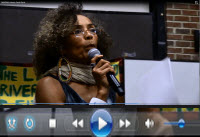
- Restorative Justice, Fania Davis addresses ways in which restorative justice can move us toward a sustainable energy future in particular, and more generally toward governance and economic systems that respect human and nature’s rights.
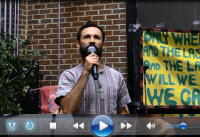
- Local Sustainable Economies, Chris Tittle speaks to the options available and being implemented to ensure locally sustainable, community-driven economic systems that benefit nature and people.
Judges Rulings
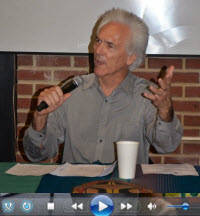
At the conclusion of testimony of the seven expert witnesses, judges asked a series of questions of the witnesses. Prosecutor Linda Sheehan presented her closing summary of arguments and proposals presented followed by a response from the Defense representative, a closing overview by the moderator and how to engage in your community.
Having heard the witnesses and deliberated options, one by one the five Tribunal judges unanimously agreed with the Prosecutions assertions. Carl Anthony opened the response by noted the [California] state legislature needs to take up rights of nature legislation. Courtney Cummings responded that these actions are a violation of Mother Earth and her rights. The industry is guilty of believing animal life is unimportant and can be used to make money.
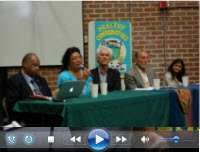
Brian Swimme reflected on the eloquent wisdom shared especially by the Indigenous judge and witnesses as he stated, “We need to learn to listen to the land. As we listen, we do not always hear English. We need to break out of our “tight capsule.” It’s easy to pass judgment – has Chevron ever listened to the land or made an effort to hear what land was offering? Do any governments or corporations listen to the land? No – they violate the rights of nature. If we recognize the rights of nature, we have to ask before we get involved.
“The question for us now is How can we become involved in a way that is mutually enhancing? We need to invest heavily in those endeavors that are attempting to listen to those unheard voices – people and land – and join us in the efforts to listen.”
Bill Twist of the Pachamama Alliance concurred with the Prosecution and recommended that specific actions be taken to redesign governance and economic systems. “The economic system we have continues to propagate rights of nature violations. Among the actions we can take, for example, is to put a price on carbon emissions to start and give refund to people who adopt alternative solutions. As a country, we need to make it clear that rights are for all living beings and not fictional entities. Corporations are not persons.”
Anuradha Mittal agrees with the Prosecutor’s three points and adds. “As Chair, I am struck that we are sitting here talking about the rights of nature. The legal system does not in fact deliver justice. In the US, there is an urgent need to address politics and the role of money. I agree with Carl that we need hearings and legislation in California. We need an international scope to justice as well; not just local.”
Web of Life Labyrinth — Prelude to the Tribunal
Participants were invited to walk the Web of Life Labyrinth on their way into the Bay Area People’s Tribunal on Rights of Nature. Walking the labyrinth serves as a gateway for connecting to the depth of our reality, into a new way of being as an Earth Community. Each person selected a Web of Life Labyrinth card with a description of a member of our Earth Community whose life is threatened or who has become extinct because of fossil fuels. The Walk a moment with the village heart poem, written by Jeff Conant for the occasion, is inscribed on each card. As people walk the labyrinth, they reflect on the impacted life and the powerful act of Walk a moment with the village heart.
More about the labyrinth, including instructions for creating one, is at Web of Life Labyrinth.
[yframe url=’https://www.youtube.com/watch?v=Z-JLHoJKRmU’]
Bay Area Rights of Nature Alliance
The event is one in a series of global tribunals examining local issues in the context of Rights of Nature. Attracting some 150 participants, the event served to launch the work of the newly formed Bay Area Rights of Nature Alliance as a forum to bring people together around advancing rights of nature in the San Francisco Bay Area.
December 5 -6, 2014, the second International Rights of Nature Tribunal will convene in Lima, Peru. The intention is to adjudicate a small number of cases aligned with the UN FCCC COP 20 priorities. Cases under review address the impacts of Climate Change, threats to the Great Barrier Reef, destructive oil and mineral extraction in Peru and South America, and protection of Defenders of the Earth such as the Bagua massacre that is on trial this year in Peru. For more information visit International Rights of Nature Tribunal.
Video introductions are by Bay Area Rights of Nature Alliance (BARONA) members: Secretariat Robin Milam, Global Alliance for the Rights of Nature; Prosecutor Linda Sheehan, Earth Law Center; and Moderator Osprey Orielle Lake, Women’s Earth and Climate Action Network.
For more on the event, visit Defending Industry Against Mother Nature (or) Does Mother Earth Sponsor Sports Teams? written by Jeff Conant as a guest blog for Global Exchange’s People to People Blog.
